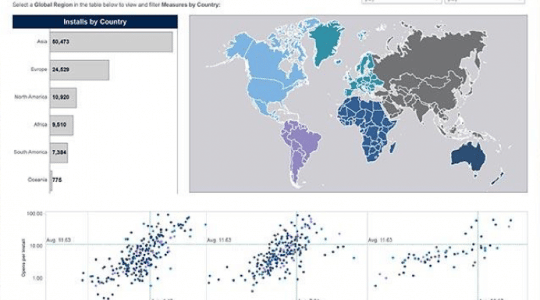
Making it as an indie developer is no walk in the park. There are over one million apps in the Apple app store alone and you are competing against huge enterprises with an already established user base along with agencies with practically unlimited resources. It’s a grim outlook.
Thankfully indie developers aren’t deterred by a challenge, and they go for it anyways. There have also been a lot of indie successes; most recently Flappy Birds, an indie shop based out of Vietnam, had been killing it in the app store (until the creator took it down for personal reasons). However, even the creator himself admits that he got a little lucky. But just because the odds aren’t great, doesn’t mean you can’t do anything to increase your chances of success. Here are a few things you can do to tip the scales in your favor.
Choose Your Category Wisely
All categories aren’t created equal. Getting in the Top Charts of a category is important, and it’s harder to break into some than others. We compiled a list of the hardest and easiest categories to target based off of the average number of ratings and what those ratings were for the top 10 apps (in each category). The number of ratings an app has is an indication (albeit a very rough indication) of how many downloads that app has, and their actual rating is an indication of how happy users are with the app.




The number of ratings you have and what those ratings are play a large role in where you will rank in the Top Charts and for your keywords. When you’re brainstorming ideas for an app, you should be strategic about what category to target. If you can pick one where the top 10 apps in that category have a low number of ratings and low average star rating, it might indicate there is space for a great app to come in and dominate that vertical.
Granted, some types of apps lend themselves to getting more and better ratings either because they will naturally attract a larger user base (e.g. social networks) or user sentiments are juxtaposed between highly positive or negative sentiments (e.g. games). However, there are definitely some gems out there where the apps are simply underperforming.
For example, the category ‘Top Paid iPhone Food And Drink Apps’ is in both the least rated and lowest rated list. If you can crack the code on what exactly people are willing to pay for pertaining to food and drink, there could be an opportunity there. Once you target a category, it’s your job as the developer to create a great app with an amazing user experience.
If you are developing an app as a sidecar passion project, go ahead and target whatever category you want. But if your goal is to create an app that generates a lot of downloads and maybe even makes some money, you need to have a game plan around what category you choose.
Keywords: Rungs in the ladder
 Strategically choosing your keywords is just as important as picking your category. You need to be thoughtful about which keywords you decide to target, which ones you put in your title, and which ones you put in your keyword field (or description for Android apps).
Strategically choosing your keywords is just as important as picking your category. You need to be thoughtful about which keywords you decide to target, which ones you put in your title, and which ones you put in your keyword field (or description for Android apps).
Let’s say you decide to make a shopping app, and you just launched. Do you really want to try to target a monster keyword like ‘shopping?’ You’ll be going up against titans like Amazon, Zappos, Forever 21, Victoria’s Secret, and eBay, along with rising stars like Wanelo and Wish.
 Have you ever heard the expression “play within yourself?” It’s a term mostly used in sports, which essentially means stick to what you’re good at – don’t try to do things outside your skill level. If you’re a 5 foot 8 basketball player like Nate Robinson, you aren’t going to be posting up against 6 foot 11 Dwight Howard. As an indie developer, you need to play within yourself. Be realistic about what keywords you have a chance to rank for and which ones you don’t.
Have you ever heard the expression “play within yourself?” It’s a term mostly used in sports, which essentially means stick to what you’re good at – don’t try to do things outside your skill level. If you’re a 5 foot 8 basketball player like Nate Robinson, you aren’t going to be posting up against 6 foot 11 Dwight Howard. As an indie developer, you need to play within yourself. Be realistic about what keywords you have a chance to rank for and which ones you don’t.
That’s not to say that one day you won’t be able to dunk over these giants, like Nate did in the dunk contest. But remember, he didn’t wake up one day with the ability to jump out of the gym. He worked on it, and you need to take baby steps to reach the top.
Even the simple change of using ‘shop online’ vs. ‘shopping’ could have a huge impact. Look at the difference in difficulty.

Yes, ‘shopping’ is searched for 9x more than ‘shop online,’ but as a new app, you actually have a chance to compete for ‘shop online.’ You have to ask yourself, do you want to big piece of a smaller pie, or a miniscule piece of a larger pie? If you don’t think you will be able to rank in the top 15 for a keyword, don’t use it. When was the last time you scrolled through 15 options when searching for an app in the app store? Just like the second page of Google search is a graveyard for web pages, once you get high enough app in the app store search, you can pretty much kiss any downloads goodbye.
‘Shop online’ has a respectable search volume, and you can use it as a stepping stone to build up a user base and start getting more downloads and ratings. Because you rank higher for keywords in your title, you can use it as a booster for terms you want to rank for, and switch those terms in and out with your updates. You’ll have your branded title which stays constant, followed by a subtitle which you strategically change (e.g. Wish – Shopping made fun). If you were an indie dev who had just launched Wish, and you decided to use ‘shop online’ instead of ‘shopping’ (because you saw you had no chance of ranking for ‘shopping’), you might start with the name ‘Wish – A fun way to shop online.’ You would include ‘shopping’ in your regular keyword field, but your main goal would be to rank highly for ‘shop online’ and acquire downloads from the easier term.
Once you have established your app as a player in the space, you can then move ‘shopping’ up into your title, and put ‘shop online’ down into your keyword field (if you still want it). Now you will have a better chance of ranking for ‘shopping’ and will be able to take advantage of it’s higher search ranking.
Play within yourself and use smaller keywords as rungs in the ladder to the ones with more volume, and ultimately the first place in the Top Charts.
Keep It Simple: Perfect the MVP
Another way playing within yourself can apply to an indie developer is to realize what you’re capabilities are and what you can handle from a development perspective. You don’t have to complicate things; make a simple product and make it well. If you add too many features, or try to go too big too fast, you will run into problems like bugs, which are kryptonite to an app’s rankings.
 If we look at Evernote’s ranking in Top Free iPhone Apps, you can see a number of spikes and drops between September and December. They also happened to have nine updates in that time. Two of those releases were new versions, and the other seven were updates fixing bugs. As new updates were released fixing the previous version’s bugs, their ranking spiked. Then as users found new bugs, their ranking dropped. Finally, on December 18th, they seemed to fix almost all the bugs of their most recent version, and they had their biggest ranking spike yet.
If we look at Evernote’s ranking in Top Free iPhone Apps, you can see a number of spikes and drops between September and December. They also happened to have nine updates in that time. Two of those releases were new versions, and the other seven were updates fixing bugs. As new updates were released fixing the previous version’s bugs, their ranking spiked. Then as users found new bugs, their ranking dropped. Finally, on December 18th, they seemed to fix almost all the bugs of their most recent version, and they had their biggest ranking spike yet.
Evernote is a full-fledged company with over $250 million dollars in funding. Don’t get me wrong, they make a fantastic product which I use every day, but even with huge team of engineers they still run into problems with bugs.
Moral of the story? Keep your app simple, and keep it bug-free. Start with a minimum-viable-product (MVP), perfect it, and built on top of that. If Flappy Bird proved anything, it’s that an app doesn’t need to be complicated to be successful. It literally has three things you can do – play the game (which consists of tapping the screen to keep your bird up), rate the game, or check out top scores. That’s it.
Play Within Yourself
The central theme to succeeding as an indie developer is to be realistic about your abilities and execute on them. These tips are by no means strict rules, they are just guidelines to follow which will hopefully help increase your chances of success. I’d love to hear any other thoughts, comments, or advice you guys have in the comments section.
Author
Becky is the Senior Content Marketing Manager at TUNE. Before TUNE, she handled content strategy and marketing communications at several tech startups in the Bay Area. Becky received her bachelor's degree in English from Wake Forest University. After a decade in San Francisco and Seattle, she has returned home to Charleston, SC, where you can find her strolling through Hampton Park with her pup and enjoying the simple things between adventures with friends and family.




Leave a Reply
You must be logged in to post a comment.